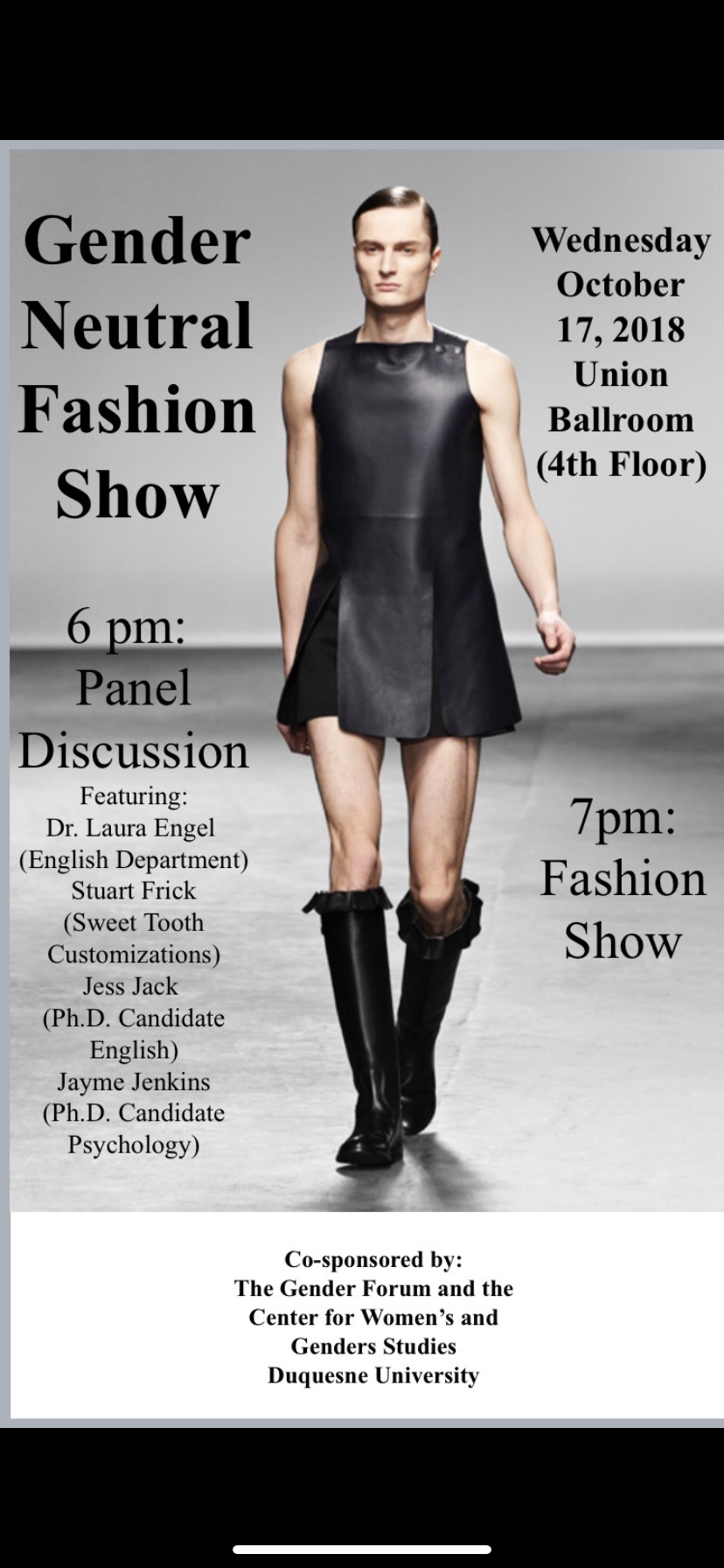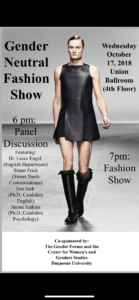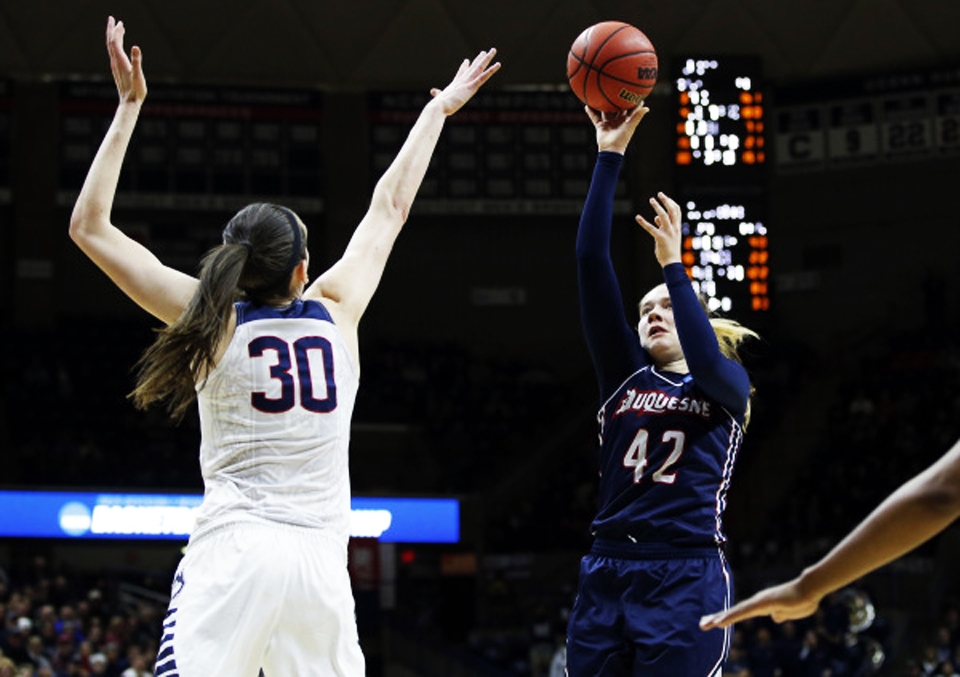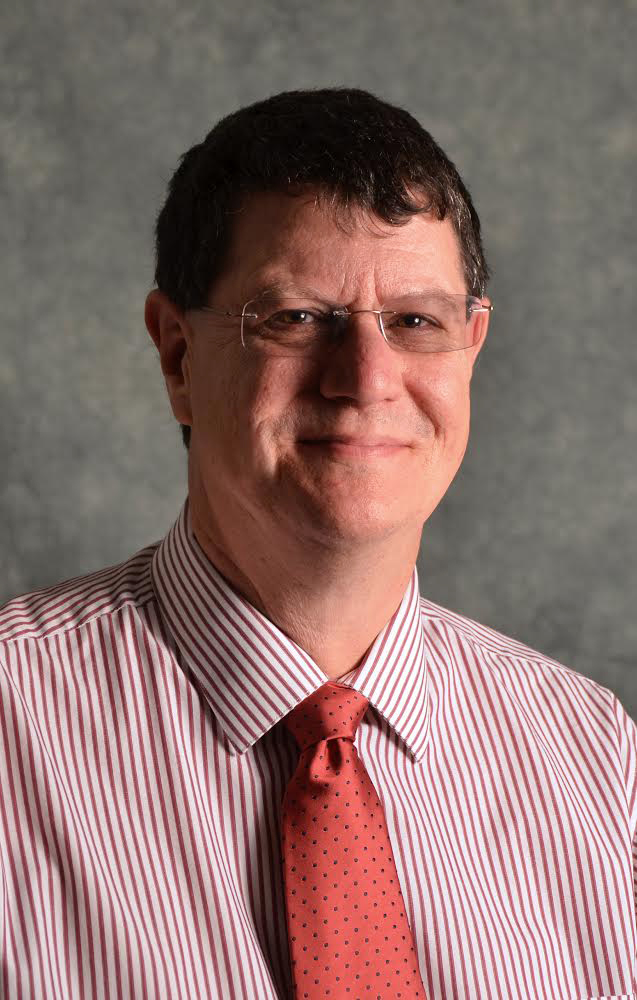

This was the flyer used last year as promotional material for the Gender Neutral Fashion Show. The university allegedly received complaints about the image displayed on the poster. As of Sept. 25 the WGS department was informed that there were issues with the terminology used, primarily the phrase “gender neutral.”
UPDATE: 9/26: This story has been updated to reflect comments provided by the Catholic Diocese.
09/26/2019
Ollie Gratzinger | editor-in-chief
Last year’s poster for the Gender Neutral Fashion Show, cohosted by the Gender Forum and Department of Women and Gender Studies (WGS), featured a male-presenting runway model sporting a dress.
The event was well attended and favorably received, according to Gender Forum President Emma Shirey.
It wasn’t until 11 months later — and while the organization was preparing for this year’s event — that higher administration officials in the university reported that due to complaints they had received about the 2018 posters, they would require that this year’s show refrain from using gender neutral language and photographs like the one on last year’s flyer. WGS faculty members and Gender Forum participants alike fear this will render the show’s message moot.
“It blindsided all of us,” Shirey said. “No one had said anything about it being problematic.”
The club was, however, aware of several posters that had been taken down or damaged by students in the weeks leading up to the event last year.
Nevertheless, Laura Engel, a professor in the department and who spoke at the academic panel which preceded the fashion show, said it was the best-attended WGS event she’d been to.
“It was really lovely,” she said.
The issue of Duquesne’s Catholic mission was raised in an official statement signed by Kristine Blair, dean of McAnulty College, and Darlene Weaver, associate provost for academic affairs, sent in response to Duke inquiries.
“No matter what group seeks to use university resources for programming, Duquesne University has consistently required that it show respect for the Catholic religious identity of the institution,” the statement said. “Faculty, staff and students share in Duquesne University’s Catholic and Spiritan mission, and therefore have a common responsibility to develop programs and events that foster academic rigor and align with our core values.”
The statement went on to say that “the posters advertising the event generated numerous complaints from a variety of students, faculty and alumni.”
As of press time, the university did not respond to inquiries regarding the character of the complaints or how many were received, but Greg Barnhisel said he’d heard from well-informed sources that they came from the top.
“I heard that some of these complaints originated from outside the university, even with the office of the bishop and Bishop Zubik himself. Also with donors,” said Barnhisel, who has been the chair of the English department at Duquesne for the last six years, and the director of freshman writing for 10 years before that. “It is not appropriate for the office of the diocese and donors to have any say in what is fundamentally an academic program.”
In a statement issued to Pittsburgh Magazine after it picked up a version of this story, the Catholic Diocese said, “Last year Bishop Zubik received several complaints about the advertisements for a gender neutral fashion show at Duquesne University. The diocese referred the complaints to the university out of concern that the event, as advertised, did not reflect Catholic teaching on gender. Our Catholic faith teaches that gender is a gift from God.
“Neither the bishop nor diocesan staff instructed the university on what action to take, but it is the responsibility of all diocesan bishops to remind every Catholic institution in their diocese that Catholic institutions have an obligation to reflect Catholic teaching. God loves everyone, including the students involved in the fashion show, but not all events are appropriate for sponsorship by a Catholic school.”
Barnhisel said there was a lot of discussion about the event in higher administration, though none of it was conveyed to faculty members. The Gender Forum was not notified of any issues with this year’s fashion show until a month before it was set to happen either, according to Shirey. When they were informed in early September, they were not given a reason why. Barnhisel said that faculty members, too, were initially left in the dark.
Engel, a professor of 18th-century literature, theatre and gender studies, said she was confused when she heard from her colleagues that the event was facing so much backlash.
“The runway walk was people wearing clothes that you would see people wearing every day. This was not a costume show; this was a show about people just walking and saying hello and being appreciated for how they wanted to present themselves,” she said. “It was really one of those special moments at Duquesne.”
Engel explained that gender neutrality is nothing new; in the 18th century, fashion was very ambiguous, and men’s high fashion was often marked by wigs, makeup and high heels. She also mentioned that the initial pushback from the administration could send a negative message to students.
“Students need to feel safe and know that they have allies and advocates,” she said.
In the statement, the university said that it never cancelled or banned the event. Rather, Blair and Weaver wrote that, before approving space and resource allocation for the fashion show, “[the university] has sought to determine that the program is academically-focused and that promotional materials are not designed in a fashion that will unnecessarily offend others.”
They also claim that the process took 11 months because of leadership changes and staff turnover in other offices. Blair and Weaver both began their tenures as dean and associate provost respectively in July.
James Swindal, who was McAnulty’s dean at the time of last year’s event, had signed off on the posters, according to Shirey, and was in attendance at the fashion show. Swindal could not be reached for comment by press time.
On Sept. 25, faculty of the WGS department met with university administration to discuss an alternative event. At that meeting, according to Linda Kinnahan, professor of English and founding member of WGS, the Gender Forum was cleared to hold an event similar to last year’s fashion show, as long as they abided by the restrictions outlined by the university — eliminating “gender neutral” and similar language, and refraining from using images that the university could consider offensive.
“It’s our understanding as of today that we can proceed with an event,” Kinnahan said. “But we’ve been told that the image [on the poster] was a problem in combination with the language, particularly the term ‘gender neutral.’”
By failing to communicate the aforementioned issues sooner, some students and faculty still feel as though the university effectively hindered the show’s production, even if it was never cancelled outright.
“When these complaints were made, we were never informed except for … complaints about the image on the poster,” Kinnahan said. “All of these delays have had the effect of endangering, if not cancelling the event.”
Kinnahan and other faculty members also worry about the possible implications of the university putting limitations on what words can or cannot be used in an academic setting.
“The questioning of this event and the restrictions that have now been placed upon it endanger the sense of belonging that students have here,” she said. “‘Gender neutral’ is an academic, theoretical and popular culture term that has a broad range of meanings. But nonetheless, that language seemed to stir up some complaints.”
According to Danielle Vecchione, the Gender Forum’s president last year when the fashion show first took place, this is not the first time the club has faced complications with the administration.
“Students were ripping down our posters and … faculty and staff did nothing to help or support [us]. Basically, there has been a lot of ‘we don’t want to rock the boat’ from the school, faculty and staff,” Vecchione said.
Faith Barrett, faculty adviser to the Gender Forum and chair of the WGS department, highlighted a part of Duquense’s Mission Statement, which advocates for celebrating all students.
“The Duquesne University website notes among university goals the intention to ‘create an environment of unconditional inclusion,’” Barrett said. “I hope that the higher administration can live up to this commitment, recognizing as the website also says, that ‘we welcome diversity because it enriches us all.’”
Barrett also said that Blair and Swindal have both been allies to the department.
Stew Frick, a nonbinary fashion designer, does not attend Duquesne, but they were set to resume their role as featured designer at this year’s show. But as the event faced an adverse reaction from the administration, Frick said they were “really disappointed.”
“The development of being offered a fashion show, as long as the inclusion of queerness is erased, is a continuation of the initial position by the Duquesne administration to erase the queerness of their students,” Frick said. “The offer of putting on a show while simultaneously eliminating the original purpose of having a gender neutral fashion show — to signal to queer students that they are welcome, accepted and that they have the right to feel secure in the clothes they choose to wear — fills me with disappointment and sadness for the queer students of Duquesne.”
Shirey and Frick both share the sentiment that the university has taken a stance against LGBTQ+ students and community members.
“It was us versus the university, which sucks when you’re a student,” Shirey said. “You’re paying them. You are a leader of a lot of students who are putting money into a university which clearly does not support them.”
Frick said they’ve been inspired by the LGBTQ+ students of Duquesne, and that they do not envy those students for attending an institution “which has so clearly shown that it is unwilling to support and defend them.”
“Not only has the administration shown that they are unwilling to weather a few homophobic complaints about a completely school-appropriate poster, but they are also willing to erase those same queer students’ identity while trying to pose that same erasure as an olive branch, a compromise.”
The Gender Forum and WGS department has decided to move forward with the show despite the university’s restrictions. It will be held on Wednesday, Oct. 23 from 5 p.m. to 7 p.m. in the Union Ballroom. Anyone interested in participating as a model in the event should contact the Gender Forum at thegenderforum@gmail.com.



